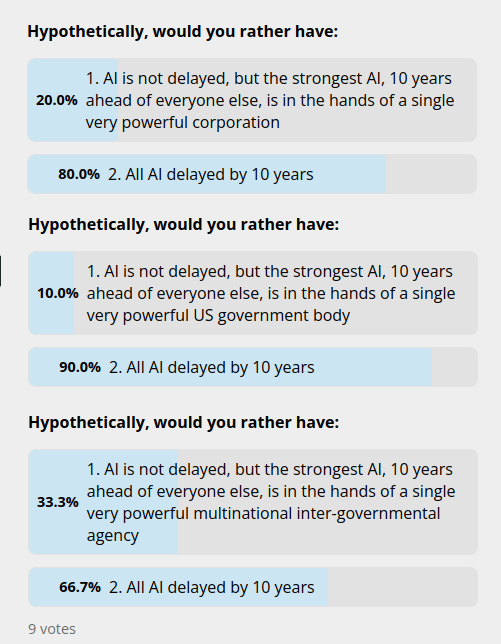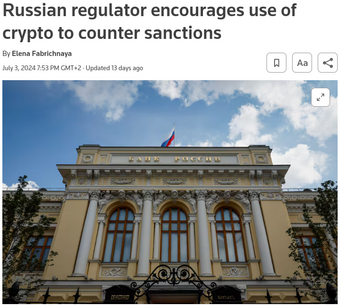Vitalik's new article: Don't decide your political stance just because someone "supports cryptocurrencies"
By: Vitalik Buterin
Compiled by: Xiaobai Navigation coderworld
在过去几年里,“加密货币”在政治政策中的重要性日益增加,各个司法管辖区正在考虑不同的法案来规范BlockchainFor example, the EUMarkets in Crypto-Assets Regulation (MiCA),UK’s regulatory efforts on stablecoins, and the complexities of the U.S. Securities and Exchange Commission (SEC)legislationand enforcement attempts. In my opinion, most of these bills are reasonable, although there are concerns that the government will take extreme measures, such asTreating almost all tokens as securitiesorSelf-hosted wallets are prohibitedAs a result of these concerns, more and more cryptocurrency practitioners have begun to actively participate in politics, and their support is almost entirely based on the attitudes of political parties and candidates towards "cryptocurrency".
In this article, I argue against this trend, specifically because I believe this approach to decision making carries a high risk of going against your original reasons and values for entering the cryptocurrency space.

(I took a picture with Vladimir Putin in 2018. At the time, many Russian government officials expressed a willingness to be open to “cryptocurrency.”)
“Cryptocurrency” is not just cryptocurrency andBlockchain
There is often a tendency in the cryptocurrency space to overemphasize the importance of “money” and the importance of holding and using money (or “Token”) as the most important political issue. I agree that this is indeed a crucial battle: in modern society, everything important requires money, so if you can cut off anyone’s funding, you can suppress your political opponents at will.Zooko's continued advocacy的私下花钱的权利也是同样重要的。发行代币的能力能够显著提升人们创建具有集体经济力量的数字组织的能力。然而,几乎完全专注于加密货币和BlockchainIt’s hard to defend, and importantly, it’s not the idea that gave rise to cryptocurrencies in the first place.
The original creator of cryptocurrency wasCypherpunk movement, a broader techno-liberal ethos that advocates for the general protection and enhancement of individual freedoms through free and open technology. In the 2000s, the main theme was to fight against the influence of corporate lobbying groups such as RIAA and MPAA) has pushed for restrictive copyright legislation, which the Internet calls "MAFIAAOne famous legal case that caused a lot of outrage was Capitol Records, Inc. v. Thomas-RassetIn a 2016 case, the defendants were forced to pay $222,000 in damages for illegally downloading 24 songs through file-sharing networks. The main tools of the battle were torrent networks, encryption, and internet anonymization. One lesson learned early on was the importance of decentralization. AsSatoshi NakamotoAs he explained in one of his few public political statements:
A detailed description of the system's vulnerability to the use of violent monopoly is omitted.
You won't find solutions to political problems in cryptography.
Yes, but we could win an important battle in the arms race and gain a new realm of freedom in a few years.
Governments are good at decapitating centrally controlled networks like Napster, but pure P2P networks like Gnutella and Tor seem to be able to stand on their own.
Bitcoin is seen as an extension of this spirit in the field of Internet payment. There are even early "Regeneration Culture” Equivalent: Bitcoin is a very simple method of online payment, and therefore can be used to organize ways of compensating artists for their work without having to rely on restrictive copyright laws. I’ve been involved in this kind of activity myself: in 2011, when I was writing for Bitcoin Weekly, I developed a mechanism whereby we would publish the first paragraph of two new articles I’d written and hold the rest for “ransom”, releasing the content when the total amount of donations reached a certain specified amount of BTC.
Bitcoin was seen as a way to extend this spirit into the realm of internet payments. In the early days there was even a “Regeneration Culture” phenomenon: Bitcoin, as an extremely convenient means of online payment, can be used to organize ways to compensate artists for their work without relying on strict copyright laws. I’ve been involved in this myself: while writing for Bitcoin Weekly in 2011, I devised a mechanism whereby we would publish the first paragraph of two new articles I’d written, and thenRelease the remaining "ransom"The full content will be released only when the total donation amount of the public address reaches the specified BTC amount.
所有这些都是为了说明最初创造区块链和加密货币的心态:Freedom is vital, decentralized networks excel at protecting it, and money is one important area where these networks can be applied, but it is only one of many important areas.In fact, there are several important areas where you don’t need a decentralized network at all: you just need cryptography and one-to-one communication applied correctly. The idea that freedom of payment is central to all other freedoms is an afterthought — an ideological post hoc designed to justify “digital upswing,” a cynic might say.
我能想到至少还有几种其他技术自由,它们与使用加密代币的自由同样“基础”:
-
Freedom and Privacy of Communications:This includesEncrypted messages and anonymityname.Zero knowledge proofIt not only protects pseudo-anonymity, but also ensures important authenticity claims (such as the message is indeed sent by a real person), so it supportsZero knowledge proofThe application is very important.
-
Privacy-friendly digital identity freedom:虽然这里有一些区块链应用,特别是在允许撤销和去中心化“证明否定”方面,但实际上哈希、签名和Zero knowledge proofis used more frequently.
-
Freedom of Thought and Privacy:As our activities are increasingly AI 互动以更深层次的方式进行,这一点在未来几十年将变得越来越重要。如果没有重大改变,我们的思想将越来越多地被集中化的 AI 公司持有的服务器直接中介和读取。
-
High-quality information acquisition:Social technology can help people form high-quality opinions in adversarial environments.Optimistic about prediction markets and community notes; You may have a different solution, but the point is that this problem is important.
And that’s just the technical aspects of freedom. The goals that motivate people to build and participate in blockchain applications often have implications beyond the technology: if you care about freedom, you might want your government to respect your freedom to choose the type of family you want. If you care about building a more efficient and fair economy, you might care about this inHousing impact.etc.
My core point is:If you are willing to read this article, you are involved in cryptocurrency not just because it is cryptocurrency, but because of deeper goals. Don't just support cryptocurrency itself, but support those deeper goals and the policy impact it brings.
Current “pro-crypto” initiatives, at least as of today, don’t think this way:

(StandWithCrypto Tracking of “key bills”. No attempt is made to judge the freedoms related to cryptography and technology beyond cryptocurrencies.)
If a politician supports your freedom to trade tokens, but they don’t mention the above topic, then the thought process that led them to support the freedom to trade tokens is very different from mine (and likely yours). This means there’s a high risk that they may come to different conclusions than you on the issues you care about in the future.
Cryptocurrency and internationalism

(Ethereum node map, source ethernodes.org)
InternationalismThis has always been a social and political cause that I and many cypherpunks take very seriously. National egalitarian politics have a critical blind spot in this regard: they enact all sorts of restrictive economic policies to try to “protect workers” domestically, but tend to ignore the fact that two-thirds of global inequality actually occurs inBetween countries, not within them. A popular recent strategy for protecting domestic workers is to impose tariffs; but even if tariffs achieve their goal of protecting domestic workers, unfortunately, this is often at the expense of workers in other countries. One of the important liberating features of the Internet is that, in theory, it does not distinguish between the richest and the poorest countries. Once most people have access to basic Internet access, we can have a more equal and global digital society. Cryptocurrencies extend these ideals to the realm of money and economic interactions, which has the potential to significantly promote the balanced development of the global economy, and I have personally witnessed many cases of this.
But if I care about “cryptocurrency” because it’s good for internationalism, then I should also judge politicians by how much they and their policies care about the outside world. I won’t give specific examples, but it’s clear that many fail on this criterion.
Sometimes, this is even about the “crypto industry.” While attending EthCC recently, I received messages from multiple friends who told me that they couldn’t come because Schengen visas had become more difficult to obtain. Visa availability is a choice. Devcon The United States also performs poorly in this regard.The crypto industry is uniquely international, so immigration law is also crypto law to some extent. So which politicians and countries can realize this?
Being crypto-friendly now doesn’t mean it will be crypto-friendly five years from now
If you see a politician is friendly toward crypto, you can look up what they thought about crypto five years ago. Similarly, look up what they thought about related topics five years ago, like encrypted messaging. In particular, try to find a topic where "pro-freedom" doesn't align with "pro-corporations"; the copyright wars of the 2000s are a good example. This can help you predict how their opinions might change over the next five years.
Decentralization and acceleration: diverging goals
One possible situation where disagreement may arise is whenDecentralizationandAccelerated developmentLast year, I conductedA series of opinion polls, mainly asking people which one they value more in the context of AI. The results show that people clearly prefer the former:

Regulation is generally bad for both decentralization and accelerated development: it makes the industry more centralized and slows it down. Many of the most pernicious cryptocurrency regulations (such as “mandatory KYC for all transactions”) are certainly moving in this direction. However, these goals sometimes diverge. For AI, this may already be happening. Decentralization-focused AI strategies focus on small models that run on consumer hardware, thereby avoiding a dystopia of privacy and centralized control, in which all AI relies on centralized servers that can see everything we do and whose operators’ biases influence the AI’s output, leaving us with no escape. One advantage of a small model strategy is that it is more favorable to AI. Safety, because small models are inherently more limited in their capabilities, more like tools than independent agents. Meanwhile, AI strategies focused on acceleration are enthusiastic about everything from the smallest models running on tiny chips to the $7 trillion clusters of Sam Altman’s dreams.
As far as I know, we haven’t seen such a big split in the crypto space yet, but it’s likely to happen in the future. If you meet a “pro-crypto” politician today, it’s worth exploring their underlying values and observing which side they would prioritize in the event of a conflict.
What “Crypto-Friendly” Means in the Eyes of Authoritarians
There is a “crypto-friendly” style common to authoritarian governments that is worth being wary of. The best example is modern Russia.
The recent Russian government policy on cryptocurrencies is quite simple and has two aspects:
-
When we use cryptocurrencies, this helps us avoid other people’s restrictions, so that’s good.
-
This makes it harder for us to restrict or monitor you when you use cryptocurrency, orPut you in jail for 9 years because you donated $30 to Ukraine, so this is bad.
Here are examples of each type of Russian government action:

Another important conclusion is that if a politician today supports cryptocurrency, but they themselves are very power-seeking, or willing to curry favor with power-seekers, then ten years from now their cryptocurrency advocacy will likely move in that direction. This is almost inevitable if they or the people they curry favor with actually consolidate power. In addition, it is worth noting that the strategy of trying to get close to dangerous people in order to "help them become better"oftenmeetingCounterproductive.
But I like a certain politician because of their overall platform and views, not just because they support crypto! So why shouldn’t I be enthusiastic about their crypto stance?
The game of politics is far more complicated than “who wins the next election” and your words and actions can affect many aspects. In particular,When you publicly express support for a “pro-crypto” candidate simply because they support cryptocurrency, you are helping to create an incentive for politicians to think that supporting cryptocurrency will earn them your support.Even if they also support banning encrypted messaging, even if they’re power-seeking narcissists, or pushing bills that make it harder for your Chinese or Indian friends to attend the next crypto conference — these politicians just need to make sure you can easily trade cryptocurrencies.

(“A Man Flipping Gold Coins in a Jail Cell”, generated using StableDiffusion 3 running locally)
Whether you’re someone preparing to donate millions of dollars, someone preparing to influence millions of Twitter followers, or just an average person, you can help create more honorable incentives.
If a politician supports cryptocurrencies, the key questions are:Are their motives right?Do they have a vision for 21st century technology, politics, and economics that aligns with yours? Do they have a positive vision that goes beyond short-term gains (like “fight the opposition”)? If so, great: you should support them and make it clear that this is why you support them. If not, thenXiaobai NavigationYou either stay out of it completely or look for more suitable allies.
The article comes from the Internet:Vitalik's new article: Don't decide your political stance just because someone "supports cryptocurrencies"
Related recommendation: ENS v2: Redefining Ethereum domain name service?
The ENS v2 plan is not just about migrating some protocols, but also about redesigning the architecture from scratch. Written by: 0XNATALIE Yesterday, ENS Labs announced the launch of the ENS v2 plan, which aims to expand the Ethereum Name Service (ENS) to Layer 2, and reduce the complexity of the ENS by migrating some of the core functions of ENS to Layer 2.